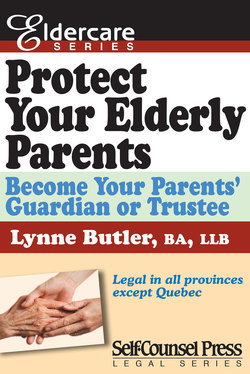Читать книгу Protect Your Elderly Parents - Lynne Butler - Страница 28
На сайте Литреса книга снята с продажи.
5. Health Care Directive
ОглавлениеThis document goes by various names across Canada, such as Health Care Directive, Advance Health Care Directive, Advance Directive, Personal Directive, and Power of Attorney for Personal Care. It will be referred to as a Health Care Directive in this book. Though it goes by various names, it has one main purpose: it names an individual to act as a spokesperson and decision maker for an elderly person who is unable to make or communicate his or her own decisions about personal and health matters.
The type of decisions that can be made by a person (called an agent in this book) appointed under a Health Care Directive roughly corresponds with the type of decisions that would be made by a court-appointed guardian. This would include medical decisions about surgery, tests, treatments, and medications. It would also include other personal decisions such as where and how the elderly relative will live. If a valid Health Care Directive is in place, it is highly unlikely that anyone will need to be appointed by the court as guardian.
This is not a document that you can impose on your elderly relative by applying to the court for an order. The courts are not involved at all in creating the Health Care Directive. The Health Care Directive is signed by the elderly relative and it is an expression of his or her wishes. By signing this kind of document, the elderly relative has the opportunity to choose a spokesperson for himself or herself as opposed to having the choice imposed on him or her by other people. The elderly person also gets to express his or her thoughts about whether or not he or she wishes to donate organs after death or be kept alive artificially, if in a vegetative state.
Estate planning lawyers encourage their clients to sign this very useful document well in advance of any mental or physical problems arising. That way, the document is ready to be used when it is needed and the family need not go to the expense, delay, stress, and possible disputes of applying to the court to appoint a guardian. However, not everyone has signed a Health Care Directive, either because they had no opportunity to do so or because they chose not to do so. It is important to note that if your elderly relative has already lost his or her mental ability to understand legal documents, it may be too late for him or her to sign a Health Care Directive.
If you are not sure whether your relative has capacity, you should discuss this with his or her regular doctor. Capacity is a complex concept. A person who has lost capacity to do one thing, such as deal with money, may not necessarily have lost capacity with respect to other things.
If your elderly relative still does have the mental capacity to understand the nature of a Health Care Directive and understand what it would mean to sign one, this might be a viable alternative to involving the courts. It is beyond the scope of this book to give instructions on how the document is to be prepared. You may assist your elderly relative in seeing a lawyer to have this document prepared, or you may look for a self-help book that gives instructions on how to prepare a Health Care Directive. For more information see the Power of Attorney Kit, another book published by Self-Counsel Press.
In the event that your elderly relative does already have a Health Care Directive in place, you should read the document carefully to determine whether it can be used in your situation instead of applying to the court for a guardian. The document will tell you, first of all, who the relative has chosen as his or her spokesperson. It might not be a person you would have chosen but you will have to live with that choice. The document can only be used by the person named in it. It will also give some guidance as to the health care preferred by the relative. If you doubt the document’s validity, you might consult an estate-planning lawyer to review the Health Care Directive. Assuming that the document is valid, it can be presented to the hospital or other facility in which the relative is to be treated or admitted, without any court involvement whatsoever.
